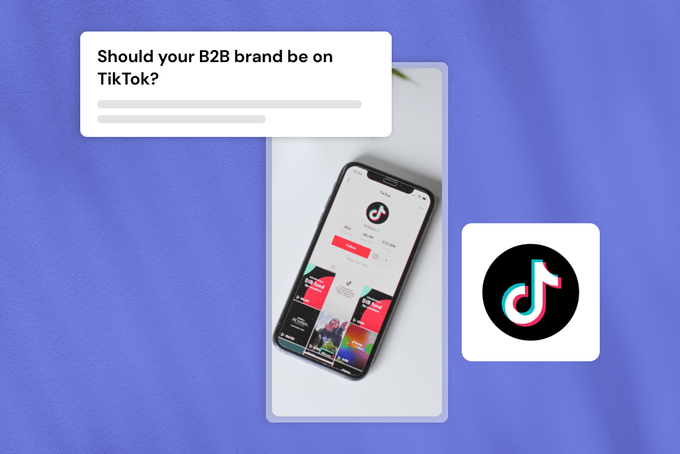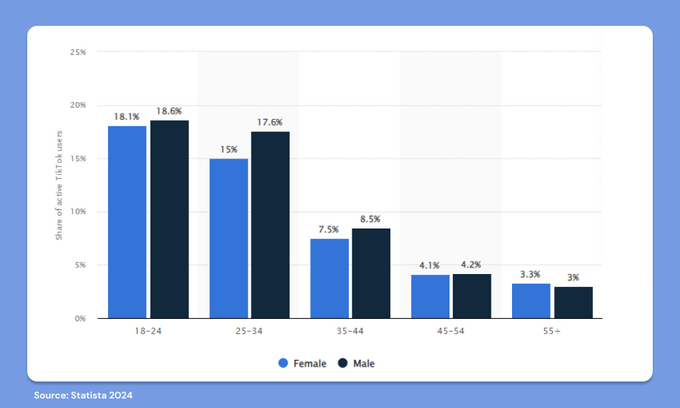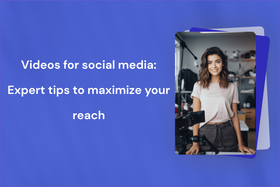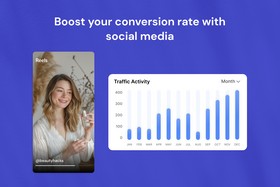TikTok for B2B marketing: Is there real value for your brand?
TikTok is quickly becoming the go-to platform for consumers looking for answers, and B2B brands are playing catch-up. But is it worth it?
Published June 12, 2024

AI Summary
Key takeaways
- TikTok isn't just for entertainment anymore—even B2B brands are hopping on the bandwagon.
- B2B brands are learning to add fun and boldness to keep their content engaging and relatable.
- B2B brands must find creative ways to use UGC.
- Brands must embrace influencer-driven, budget-friendly content on TikTok for success.
Once dominated by entertainment-focused content, TikTok has taken an unexpected turn. With about $10 billion in consumer spending globally, the platform is now piquing the interest of businesses, even those in the B2B space.
But while B2C brands appear to be achieving more than favorable results on TikTok, those in the B2B space aren't as eager to get on board due to concerns about effectively (and, of course, affordably) creating content that aligns with their brand image and reaches their target audience.
Let's explore whether TikTok holds the key to success for your B2B brand.
B2B vs. B2C: What sets them apart on TikTok?
There's a pretty clear gap between B2C and B2B companies. B2C brands usually go for the younger crowd—especially in fashion-related industries—making TikTok a perfect fit.
Here's where it gets interesting.
Contrary to popular belief, only about a third of TikTok users are under 25. Because of this, more and more B2B brands are taking their marketing efforts to TikTok.
B2B brands typically produce informational, educational, or branded content showcasing their products. However, there's limited engagement on product-focused content, and if you rely solely on this approach, you might miss out on important opportunities.
By developing product-focused content, you aren't necessarily engaging authentically with your audience. Considering the 80/20 principle, there is a place for products in content.
But, if that's the only type of content you're producing, you won't be able to connect with your audience as effectively as when you post content they're genuinely interested in. For instance, Intel focuses on creating educational and informational yet engaging content.
B2C brands, on the other hand, find it easier to create consumer-focused, entertaining content. For instance, companies like Scrub Daddy regularly post fun and playful videos that align with their brand's voice. This kind of content is not only engaging but contributes to brand awareness.
What kind of B2B content works on TikTok?
If you go on TikTok and search for B2B topics, you'll find it's buzzing with views. Users are drawn to this type of content. It's not just rudimentary "how to start a business" or "building a website" content either. You'll see some executive-level content, too.
Why does this type of content work on the platform?
The key here is a mix of entertainment, education, and a bit of boldness. The challenge is that as a B2B brand, you want to present professionally and seriously, so creating fun content may be a big leap with some risk attached to your brand image.
Morning Brew, the newsletter acquired by Business Insider, makes a very bold move toward the funny side of business.
With TikTok, you can make content that fits into different parts of the customer journey. This example Gong.io shows that not every video needs to promote a specific product. By sharing high-value informational content, Gong is able to engage its followers and draw potential customers in with top-of-the-funnel content.
B2Bs on the platform are learning to strike a balance. They're taking cues from regular users and influencers who know how to make authentic content that's interesting and feels like it's made for the people who watch it. It's all about being engaging and relatable.
» Learn how thought leadership is revolutionizing content creation.
Leveraging UGC as a B2B brand
User-generated content (UGC) is all about getting your customers to create content for your brand. UGC can help inspire, educate, convert, and retain customers for your brand. Try the following approaches to implement UGC in your strategy:
- User reviews (especially video reviews): Reviews from other users can help new users adopt the product or service.
- Promotion: When discussing your product, you should quote users' experiences that tell how it provided the perfect solution to their pain points.
- Case studies: Putting out case studies that show the practical application of your product for other users can be the final point of conversion. Users get to see examples of your product in action.
- Create dedicated UGC channels: Use social media to your advantage. You can develop a community by encouraging users to post on your pages and, in turn, use that content in other marketing endeavors.
B2B is often about solving problems and sharing knowledge. You want to avoid plain product reviews or how-to demonstrations, find a way to be creative, and make people want to create content related to your brand.
Sage uses UGC quite well to show how their product enhances their users' business and lets them "focus on the fun stuff" in this TikTok:
» Stand out from the crowd and create content that converts.
The evolving role of TikTok for B2B brands
Technology is moving fast because of AI, making creating content much easier for everyone. This democratization of content creation is shifting power towards individual creators.
Now, for B2B brands, this is a bit of a curveball. You're likely used to making top-quality, high-end content that makes your brand look professional. But now, you've got to change your strategy to compete.
To keep up with platforms like TikTok and prepare for the changes coming to search, you need to cut down on those big production costs and focus on being real and informative. The shift towards content created by individuals and influencers will likely continue and accelerate, so B2B brands must be agile and adapt quickly.
One example of a brand successfully navigating this transition is monday.com, which creates TikTok content that looks user-generated. They're doing it right.
And it's not just them. Many B2B brands are looking at everyday creators and saying, "Hey, we can do that too." It's the way things are moving.
The trend is all about content made by everyday people, and the challenge for brands is to figure out how to make authentic, personalized content without blowing their budgets.
» Learn how creators are monetizing their expertise with video content.
So, is TikTok a valuable platform for B2Bs?
TikTok is increasingly recognized as a source of information, and it's likely to shape the future of B2B marketing.
While B2B brands may not get as much engagement on TikTok as B2C brands, it's still useful for getting more eyes on your products. And as more B2B brands figure out how to use TikTok the right way, it's going to give other social media platforms and even traditional SEO a run for their money.
In fact, the platform's focus on providing concise and captivating video content may even help you rank on Google Search Perspectives.



